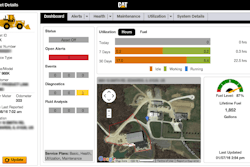One of the biggest challenges for asphalt contractors when implementing GPS tracking into their fleet operations is introducing the technology to employees. Although management may be convinced that GPS tracking will benefit the business, employees are not always on the same page at the beginning. It's common for employees to think GPS tracking is “Big Brother” or to not understand how and why the business plans to use it.
It is essential to promote driver adoption of GPS tracking before implementation to ensure a successful rollout. To build a positive perception of GPS tracking with employees, asphalt contractors should introduce the technology before implementation, address employee concerns from the start, explain why the business needs it, present the benefits to employees, and create clear guidelines and driver policies around the technology.
1. Introduce GPS tracking to Employee Before the Rollout
Some fleet managers are concerned about employees reacting negatively to their business using a GPS platform to tracking their vehicles, so they implement the system without introducing the technology to drivers. It is strongly advised for any business that plans to use GPS tracking to discuss it with drivers before implementation.
Gathering raw data for comparison before the full rollout is a fair practice, but once the decision has been made to use a system employees should be made aware. Using GPS tracking to monitor vehicle locations without employee knowledge will almost a guarantee in backlash and create a negative perception of the technology. It is important for managers to be upfront and honest about their plans to use the technology from the beginning.
2. Address Concerns
The most common concern that employees will bring up is that GPS tracking is “Big Brother,” or overly intrusive. Drivers who have worked in asphalt contracting for a long time without the use of GPS tracking may not fully understand it or think that it’s being introduced because management doesn’t trust them.
It’s important for fleet managers to listen to the objections employees have about GPS tracking and debunk the myths to alleviate concerns. Fleet managers should also explain that using GPS tracking is not about a lack of trust; it is about incorporating tools that will create better results for the business. When there is technology available to help solve difficult business challenges, perform jobs more efficiently, and increase revenue, why would it not be used?
Explaining to employees that the business will not use GPS tracking to be overly intrusive, but rather to improve productivity and help the business become more profitable will increase positive perception of the technology.
3. Explain Why the Business Needs GPS Tracking
An effective way for asphalt contractors to increase employee acceptance of GPS tracking is to explain why the business is incorporating the use of the technology. If speeding citations are higher than industry standards or fuel costs are at an all-time high fleet managers should share that information with employees. Presenting how a GPS tracking system can help solve these challenges is important and will help employees understand why the business needs it.
One of the most important reasons asphalt contractors use GPS tracking is to increase safety. GPS tracking systems are used to reduce speeding, harsh braking, rapid acceleration/deceleration, and accidents. Preventing reckless driving will create a safer work environment for drivers, and they should be pleased to work for a business with the highest safety standards.
Another reason many asphalt contractors implement GPS tracking is to reduce costs. GPS tracking systems allow fleets to reduce fuel costs, labor costs, maintenance expenses, rightsize their fleet, and more. If overhead costs are higher than they should be due to unnecessary expenses, the business will have fewer resources available to put back into the business. When employees realize that there is a need to monitor these metrics to reduce high costs and make the business more profitable, they will be far less resistant.
4. Present How GPS Tracking Benefits Employees
One of the best topics to bring up when introducing GPS tracking is how it will benefit employees directly. GPS tracking benefits asphalt contracting in many ways, like increasing revenue and making operations more efficient. When the business becomes more profitable, it will increase employees’ earning potential. Having more funds available will allow the business to increase salaries, award bonuses, and create incentives for employees.
Incentive programs are a great way to improve fleet metrics and motivate employees at the same time. A Driver Scorecard Report will rank vehicles based on speeding, rapid acceleration/deceleration, and idle time. By sharing this report’s graphical results with employees, they will have a clear understanding of what areas they need to improve to receive their incentive.
5. Write Driver Policies That Include GPS Tracking
It is a best practice for asphalt contractors to set ground rules of when and where GPS tracking will be used. It should not be a surprise to drivers when they are held accountable for their behavior with GPS tracking data. When employees understand what is expected of them and there are policies in place, there should be little to no backlash about the use GPS tracking data for employee assessments.
When writing driver policies around GPS tracking data, some important topics to cover include how GPS tracking data will be used and what will be enforced, if and how GPS tracking data will be used during employee assessment, penalties for tampering with devices, if vehicles will be monitored 24/7/365 or just during working hours, etc.
Introducing GPS tracking to employees is a common concern for many businesses during implementation. Presenting the technology in the right way is crucial to gain employee acceptance from the start. Asphalt contractors will increase positive perception of GPS tracking by explaining how and why the technology will be used, having open conversations with employees, and presenting the benefits obtainable. With the use of GPS tracking, asphalt contractors receive true fleet intelligence and gain the ability to take full control over their fleet.
Jenny Malcolm is the content marketing specialist for GPS Insight. For more information, contact GPS Insight at gpsinsight.com.



















